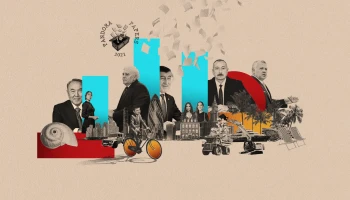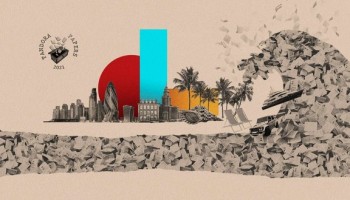“My name, first and foremost, is not there,” Kenyan President Uhuru Kenyatta told reporters who asked him about the Pandora Papers, a global cross-border investigation into offshore companies, which found that 11 members of his family secretly owned at least 13 offshore companies.
One of the firms was owned by his younger brother and held cash, stocks and bonds worth US$31.6m in 2016.
U.S. President Biden hosted Kenyatta at the White House on Thursday, during which they “underscored the need to bring additional transparency and accountability to domestic and international financial systems,” according to a White House brief.
Another major revelation in the Pandora Papers project was an OCCRP investigation which uncovered nearly $700 million worth of properties in London owned by Azerbaijani President Ilham Aliyev’s family and associates.
Aliyev, like Kenyatta, diminished the findings, calling them an attempt to “discredit” him and insisting that he was a “successful businessman" before becoming president. But Azerbaijan’s opposition party, the Movement for Democracy and Prosperity, reportedly released a statement calling on Aliyev and his family to “report on the facts about them that were mentioned in the material.”
Similarly, in Chile, President Sebastián Piñera is facing the possibility of impeachment, after his opponents launched proceedings against him over a controversial mining deal that took place nine months into his presidency.
A Pandora investigation revealed that the $152 million deal made in December 2010 involved a number of BVI-registered shell companies, a Chilean mining company partly owned by Piñera’s children, and another company owned by the President’s close friend, Carlos Alberto Délano.
But it’s not just political figures who have been under scrutiny since the revelations were made two weeks ago. The leak also highlighted the role that law firms play in forming shell companies and complex structures, which enable these elites to avoid taxes and operate in secrecy.
One major law firm implicated in the leaks was the multinational Baker Mckenzie, which an ICIJ investigation called an “architect and pillar of a shadow economy.” The investigation revealed how it has helped people and companies tied to corruption, fraud and authoritarian regimes to hide wealth or avoid taxes.
As the investigation was published, the law firm released a statement titled ‘Get the facts about our Global Tax Practice,’ and later told the American Lawyer that the investigation was “highly selective, contains inaccuracies and is speculative in nature.”
As well as highlighting the role of law firms and offshore companies, the leak also re-emphasised how certain jurisdictions, especially the U.K. and U.S., are favourable end destinations for illicit wealth, prompting renewed calls for reform in both countries.
“There’s a “for sale” sign hanging over Britain,” Labour MP Margaret Hodge wrote in a Guardian opinion piece.
“The Pandora papers have exposed how secrecy, influence, property and other assets are freely available to the highest bidder,” she said, adding that “it’s one rule for the super-rich, and another for the rest of us.”
“We need a public register of the overseas or offshore ownership of U.K. property. With transparency and accuracy we can then follow the money, limit tax avoidance and prevent shady individuals abusing the U.K. property market,” she said.





